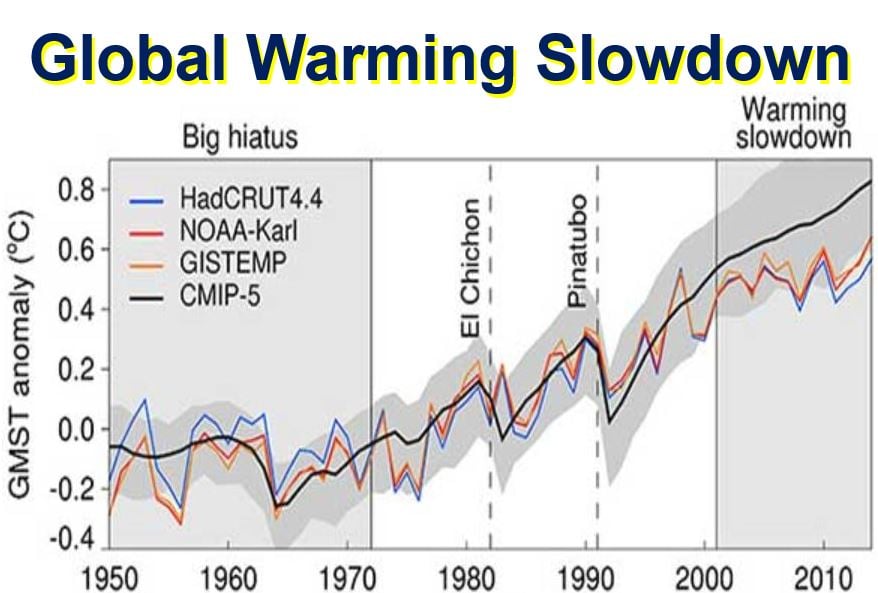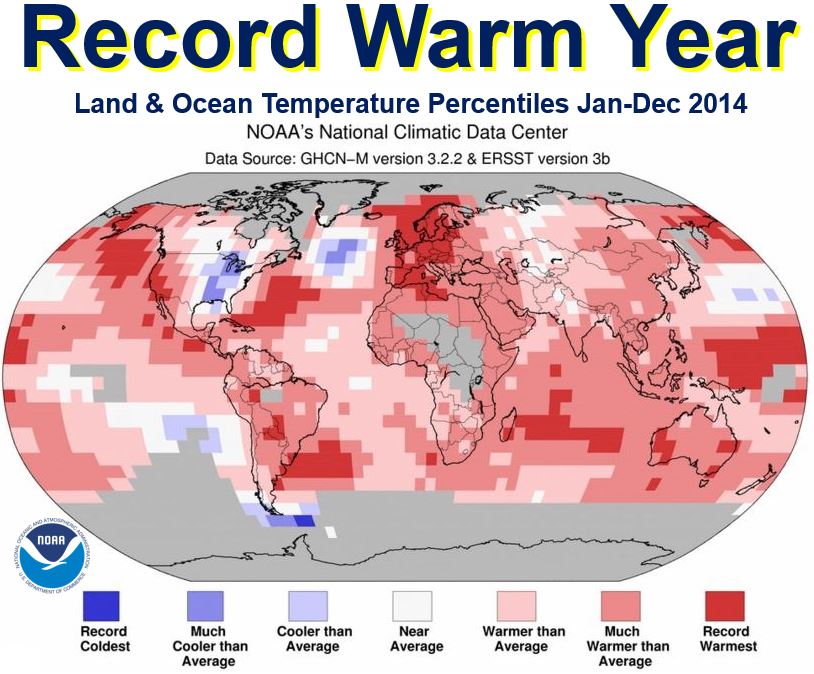The bitter debate between those who believe global warming is here – they think we are the cause and it is getting worse – and climate change deniers who pointed to a slowdown in global warming at the beginning of this century as proof that it is all a myth, is about to get heated again after scientists found that the warming did indeed slow down.
An apparent deceleration in the increase in worldwide temperatures at the start of this century, which is not explained in climate models, was referred to as a hiatus (pause) when first seen several years ago.
The global warming ‘hiatus’ spawned congressional hearings in the United States and a flood of skeptical blog posts before being curbed in 2015. Expect all that to be coming back!
 This graph shows a ‘slowdown’ in rising temperatures until 2010. The black line shows climate model temperature predictions, while the red line shows actual temperatures. Warming has recently gathered pace, breaking historical records in 2014 and 2015. (Image: Nature Climate Change)
This graph shows a ‘slowdown’ in rising temperatures until 2010. The black line shows climate model temperature predictions, while the red line shows actual temperatures. Warming has recently gathered pace, breaking historical records in 2014 and 2015. (Image: Nature Climate Change)
Hiatus not just an artefact, it was real
Climate-change deniers have held on to this slowdown for dear life, saying there is the evidence that global warming is a myth, and if it did occur, it was a temporary blip that had nothing to do with us and the planet stopped warming in 1998.
However, in June 2015, a study published in Science concluded that the hiatus was merely an artefact which disappears when biases in temperature data are corrected.
Now an international group of eminent scientists from the US, Canada, UK, Japan and Australia is challenging that claim. They wrote in the academic journal Nature Climate Change (citation below) that even after correcting these biases, the slowdown was real.
Lead author, John Fyfe, who works as a climate modeler at the Canadian Centre for Climate Modelling and Analysis in Victoria, British Columbia, said:
“There is this mismatch between what the climate models are producing and what the observations are showing. We can’t ignore it.”
 2014 was a record-breaking warm year. (Image: ncdc.noaa.gov)
2014 was a record-breaking warm year. (Image: ncdc.noaa.gov)
Dr. Fyfe refers to a ‘slowdown’ rather than a ‘hiatus’. He emphasizes that it does not in any way undermine the climate change (global warming) theory.
The controversy revolves partly around the statistics on temperature patterns and trends. The study that challenged the existence of the slowdown corrected known biases in the surface temperature record maintained by the NOAA (US National Oceanic and Atmospheric Administration), such as differences in temperature readings from buoys and ships.
Last year’s study included a record-warm year
This effectively raised the warming recorded, and the scientists also extended the record to include 2014, which was a record-hot year for average temperatures.
That study, led by director of NOAA’s National Centers for Environmental Information in North Carolina, Thomas Karl, calculated that the rate of global warming from 1950 to 1999 was 0.113 degrees Celsius per decade, similar to the 0.116°C per decade calculated for the 2000 to 2014 period.
Dr. Karl said that this meant that the 2013 assessment done by the Intergovernmental Panel on Climate Change – showing that warming had slowed – was invalid.
In this latest study, Dr. Fyfe and colleagues say that Dr. Karl’s approach was biased by a period of comparatively flat temperatures extended from the 1950s to early 1970s.
During that period, there were lower greenhouse-gas emissions, while the emissions of industrial pollutants, including sulphate (USA: sulfate) aerosols were keeping the planet cooler by reflecting the Sun’s rays back into space.
Warming slowed down considerably after 2000
According to Dr. Fyfe and team’s calculations, the Earth warmed at 0.170°C per decade from 1972 to 2001, which is considerably more than the 0.113°C per decade he and his team calculated for 2000 to 2014.
Dr. Fyfe says his approach is better, because it takes into account the events that affect decadal temperature trends. For example, studies have found that climate models overestimated the heating effect from solar radiation and underestimated the cooling effect of volcanic eruption at the beginning of this century.
Other scientists are studying variability in the Pacific Ocean, including a measure of sea surface temperatures (Pacific Decadal Oscillation). All these things can affect the climate, and mask the warming trend over the long-term.
Writing in Nature News, Jeff Tollefson quoted Susan Solomon, a climatologist at MIT, who said that Dr. Fyfe’s framework helps put 21st-century trends into perspective, and clearly shows that the rate of warming decelerated at a time when greenhouse-gas emissions were increasing dramatically.
Dr. Solomon, who is internationally recognized as a leader in atmospheric science, said:
“It’s important to explain that. As scientists, we are curious about every bump and wiggle in that curve.”
While acknowledging that investigating how short-term effects might impact decadal trends, Dr. Karl adds that these short-term trends do not necessarily explain the long-term effects of increasing concentrations of greenhouse gases in the atmosphere.
Dr. Karl said:
“What gets obfuscated is the goal of uncovering the warming due to persistent greenhouse forcing [by human emissions]. It is simply not possible to gain insight on that underlying trend from short, segmented 10- to 20-year periods.”
Director of NASA’s Goddard Institute for Space Studies in New York, Gavin Schmidt, says he is fed up with the entire discussion, which he says comes down to academic bickering and pointless arguments on definitions.
Long-term warming trend persists
He says there is no evidence pointing to a change in the long-term warming trend.
The scientific disagreement could spill over into the skeptic blogosphere. However, that is not reason enough to sweep the slowdown under the rug, says co-author Michael Mann, a climatologist at Pennsylvania State University.
Scientific American quoted Dr. Mann as saying:
“As scientists, we must go where the evidence takes us, we can’t allow our worries about climate contrarians and how they might seek to misrepresent our work to dictate what we do and do not publish.”
Anyway, what happened at the beginning of this century is now academic, because that slowdown is over and 2014 and 2015 posted record warmth.
Dr. Mann said:
“So we have every reason to believe that the warming of the planet and the detrimental impacts of that warming will continue unabated if we do not dramatically reduce our emissions.”
Citation: “Making sense of the early-2000s warming slowdown,” John C. Fyfe, Nathan P. Gillett, Shang-Ping Xie, Gerald A. Meehl, Matthew H. England, Benjamin D. Santer, Michael E. Mann, Gregory M. Flato, Ed Hawkins, Yu Kosaka & Neil C. Swart. Nature Climate Change 6, 224–228. 24 February, 2016. DOI:10.1038/nclimate2938.
Video – 10 signs that global warming is real
